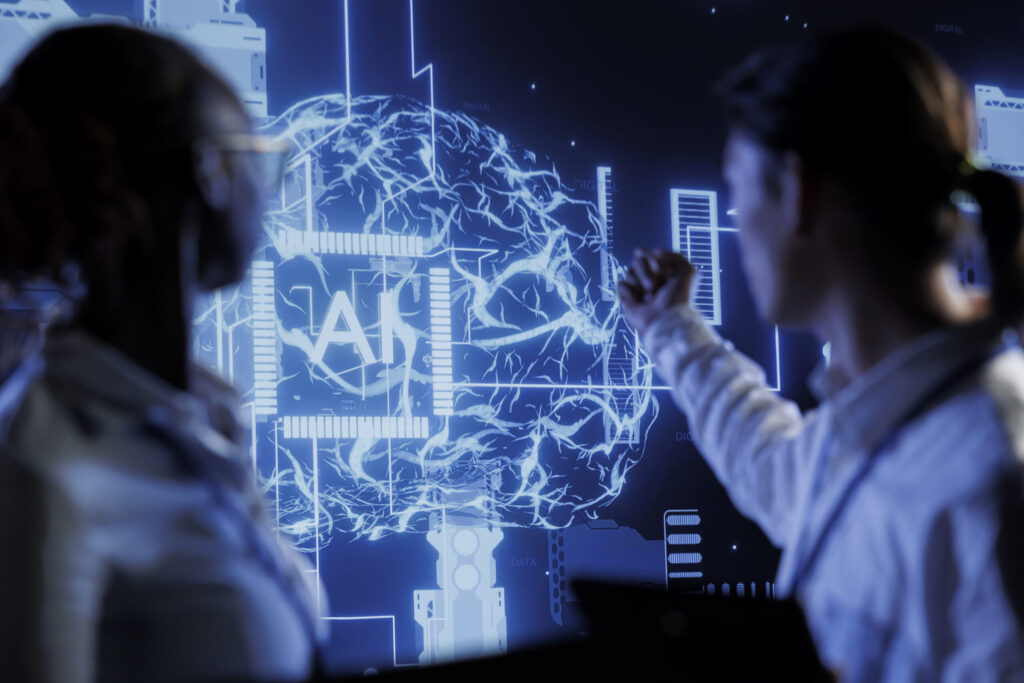Introduction
Artificial intelligence is quickly changing our world, raising the urgency of the issue surrounding responsible AI development. As AI technologies integrate into our everyday routines from virtual helpers to medical diagnoses, tackling ethical concerns has turned into both a moral obligation and a business requirement.
What appeared to be science fiction only twenty years ago autonomous cars, instant language translation, medical diagnostic devices, now embodies our current technological reality. This swift progress presents significant opportunities while also creating intricate ethical dilemmas that need to be tackled proactively.
Key Principles of Responsible AI
Fairness and Non-discrimination
- AI systems can reinforce or enhance current biases when they are trained on inaccurate data.
- Demands varied training datasets, ongoing bias evaluation, and various fairness measures.
- Requires cross-functional teams with varied viewpoints to pinpoint possible problems.
Transparency and Explainability
- The “black box” dilemma leads to trust concerns, particularly in critical situations.
- Explainable AI (XAI) methods enhance the clarity of decision-making processes.
- Organizations are required to furnish suitable records of system functions and constraints.
Privacy and Data Protection
- The advancement of AI necessitates finding a balance between data requirements and privacy rights.
- Successful methods encompass federated learning, differential privacy, and synthetic data.
- Robust data governance frameworks ought to direct the processes of collection, storage, and handling.
Accountability and Governance
- Transparent accountability pathways during the entire AI lifecycle are crucial.
- Records of design decisions and evaluations of risks offer clarity.
- Routine audits and impact evaluations assist in recognizing upcoming problems.
- It is essential to have mechanisms for remedy when systems inflict damage.
Safety and Security
- AI systems need safeguarding against adversarial attacks.
- Thorough testing in various situations aids in guaranteeing dependability.
- Continuous observation can detect unanticipated actions.
- Successful protections deter abuse or exploitation.
Implementing Responsible AI in Practice
Transforming ethical principles into tangible actions poses considerable difficulties. Organizations aiming for responsible AI development can adopt various practical strategies:
Diverse and Multidisciplinary Teams
Technologists alone cannot tackle AI ethics. Successful responsible AI necessitates cooperation among various fields, such as:
- Computing specialists and engineers.
- Moral thinkers and philosophers.
- Social researchers and behavioural scientists.
- Legal and policy specialists.
- Experts in the field of application.
- Delegates from communities that may be impacted.
This multifaceted method facilitates the early detection of potential problems and integrates various viewpoints into AI design choices.
Ethics through Design
Instead of viewing ethics as a secondary issue, responsible AI development incorporates ethical factors from the initial phases of the design process. This “design-driven ethics” method could involve:
- Ethical evaluations of risks prior to the start of a project.
- Including varied stakeholder feedback while collecting requirements.
- Incorporating explainability elements from the beginning.
- Consistent ethical evaluation milestones during development.
- Testing scenarios centered on ethics.
Incorporating ethics into the design process allows organizations to prevent expensive redesigns and align their AI systems more effectively with human values.
Comprehensive Testing and Evaluation
Responsible AI necessitates exceeding conventional software testing to assess the ethical aspects of system performance. This could involve:
- Assessing fairness among various demographic groups.
- Testing adversarial to uncover possible flaws.
- User testing involving varied demographics.
- Planning scenarios for possible misuse situations.
- Extended oversight of implemented systems.
These assessment methods aid in recognizing possible ethical concerns prior to their occurrence in practical environments.
Continuous Learning and Adaptation
AI ethics is a developing area, and responsible progress necessitates continuous learning and adjustment. Organizations ought to:
- Keep up to date with new ethical frameworks and optimal practices.
- Engage in the creation of industry standards.
- Oversee scholarly investigations into the ethics of AI.
- Sustain feedback channels from users and impacted communities.
- Consistently assess and revise ethical standards.
This commitment to continuous improvement helps organizations respond to new ethical challenges as they emerge.
Regulatory and Standards Framework
The management of AI ethics encompasses not only individual organizations but also industry standards, professional guidelines, and governmental regulations.
Emerging Regulatory Frameworks
Governments across the globe are creating regulatory strategies for AI, with differing focuses and extents:
- The AI Act of the European Union suggests a regulatory framework based on risk, imposing tougher demands on high-risk AI applications.
- The U.S. is adopting a more sector-focused strategy in creating voluntary frameworks for managing AI risks.
- China has enacted rules targeting algorithmic suggestions and deepfake technology
- Canada, Singapore, and various other countries have created AI ethics principles and governance structures.
- Entities creating AI systems must maneuver through this intricate and changing regulatory environment, frequently having to adhere to various requirements in different regions.
International Standards
Standards organizations are striving to create uniform methods for AI ethics. Significant attempts consist of:
- ISO/IEC 42001:2023 regarding AI management frameworks.
- IEEE’s initiative for Ethically Aligned Design.
- Different sector-specific standards for AI applications in healthcare, finance, and other fields.
- These standards offer useful guidelines for organizations aiming to adopt responsible AI practices consistently.
Challenges and Strains in AI Ethics
Even with increasing agreement on fundamental principles, the development of responsible AI encounters numerous notable challenges:
Balancing Innovation and Caution
A key tension in AI ethics is the need to balance advancements in technology with suitable protections. Excessively rigid strategies may suppress advantageous innovations, whereas inadequate oversight could enable detrimental applications to spread.
Achieving the appropriate balance necessitates subtle strategies that distinguish AI applications according to their possible advantages and dangers. Applications with high risks require closer examination, whereas those with lower risks may gain from more adaptable governance.
International Collaboration
AI development takes place worldwide, but ethical standards and regulations frequently differ by area. This presents difficulties for:
- Creating uniform ethical standards internationally.
- Averting regulatory arbitrage, where developers pursue environments with fewer regulations.
- Making sure ethical considerations incorporate various cultural viewpoints.
- Tackling possible competitive drawbacks for companies in areas with stricter regulations.
- Global coordination frameworks and dialogues involving multiple stakeholders are crucial for effectively tackling these challenges.
Technical Complexity
Some ethical challenges in AI stem from genuine technical difficulties. For instance:
- Developing genuinely interpretable deep learning systems.
- Establishing and assessing fairness in various contexts.
- Creating privacy-protecting methods that retain usefulness.
- Guaranteeing resilience against new adversarial assaults.
Continuous research and innovation in these fields will be vital for progressing responsible AI capabilities.
Economic and Competitive Forces
Market forces can occasionally generate motivations that clash with ethical standards. Organizations might experience pressure to:
- Quickly implement AI systems without comprehensive ethical assessment.
- Enhance data gathering while compromising privacy.
- Emphasize performance metrics more than fairness or clarity.
- Lower expenses by minimizing human supervision.
Strong governance frameworks and leadership commitment to ethical principles are essential for resisting these pressures.
The Path Forward: Building a Responsible AI Ecosystem
Developing genuinely responsible AI systems necessitates a collaborative effort among various stakeholders:
Organizations Developing and Deploying AI
Businesses and various entities developing AI systems ought to:
- Set forth defined ethical guidelines and governance frameworks.
- Establish effective methods for assessing and managing ethical risks.
- Allocate resources for training and tools that facilitate responsible development.
- Disseminate successful strategies and insights gained with the wider community.
- Interact with outside stakeholders to grasp their concerns and viewpoints.
The dedication of leadership to responsible AI is essential for guaranteeing that these practices are emphasized across the organization.
Policymakers and Regulators
Government agencies can promote responsible AI by:
- Establishing suitable regulatory structures that manage risks while promoting innovation.
- Putting resources into research regarding AI ethics and responsible development practices.
- Developing incentives for accountable practices via purchasing and funding policies.
- Promoting discussions among various stakeholders regarding new ethical issues.
- Developing technical knowledge within regulatory organizations.
Successful governance necessitates cooperation among technical specialists, ethicists, industry stakeholders, and civil community members.
Research Community
Educational and research organizations hold essential responsibilities in:
- Progressing technical methods for responsible AI (transparency, equity, confidentiality)
- Creating ethical guidelines and assessment methods.
- Carrying out empirical studies on the social effects of AI systems.
- Educating future AI developers on ethical methodologies.
- Offering an unbiased evaluation of AI technologies and methodologies.
Collaborative research and the exchange of knowledge expedite advancements in creating more accountable AI systems.
Civil Society and the Public
Wider societal involvement is crucial via:
- Promotion of responsible AI development and necessary protections.
- Involvement in public discussions and collaborative stakeholder efforts.
- Instruction on AI abilities, constraints, and ethical aspects.
- Holding developers responsible through consumer decisions and societal influence.
- Bringing varied viewpoints to influence AI regulation.
Inclusive involvement ensures that AI systems embody a wide range of societal values instead of being limited to specific technical or commercial interests.
Conclusion
As artificial intelligence progresses quickly, ethical considerations should be the cornerstone instead of an afterthought. Responsible AI development isn’t just about preventing harm, it’s about proactively designing technology that enhances human potential, honors dignity and autonomy, and fosters a fairer and more sustainable world.
The obstacles are substantial, demanding technical creativity, careful management, and continuous conversation among various fields and interested parties. However, the possible benefits are similarly significant: AI systems that enhance human abilities while embodying our most profound values and goals.
By adopting holistic strategies for AI ethics ranging from technical techniques to organizational practices and policy structures, we can address the intricacies of responsible development and leverage the transformative power of artificial intelligence for the advantage of everyone.






